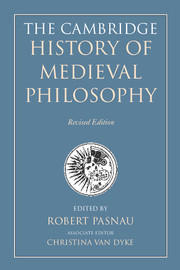Book contents
- Frontmatter
- Contents of Volume 1
- Preface
- List of contributors
- Frontmatter
- Contents of Volume 2
- Introduction
- I Fundamentals
- II Logic and language
- III Natural philosophy
- IV Soul and knowledge
- V Will and desire
- VI Ethics
- 33 Happiness
- 34 Identity and moral agency
- 35 The inclination for justice
- 36 Virtue theory
- 37 Action and intention
- 38 Practical ethics
- VII Political philosophy
- VIII Metaphysics
- IX Theology
- Appendices
- Bibliography of primary sources
- Bibliography of secondary sources
- Index nominum
- Index rerum
- References
34 - Identity and moral agency
from VI - Ethics
Published online by Cambridge University Press: 05 August 2014
- Frontmatter
- Contents of Volume 1
- Preface
- List of contributors
- Frontmatter
- Contents of Volume 2
- Introduction
- I Fundamentals
- II Logic and language
- III Natural philosophy
- IV Soul and knowledge
- V Will and desire
- VI Ethics
- 33 Happiness
- 34 Identity and moral agency
- 35 The inclination for justice
- 36 Virtue theory
- 37 Action and intention
- 38 Practical ethics
- VII Political philosophy
- VIII Metaphysics
- IX Theology
- Appendices
- Bibliography of primary sources
- Bibliography of secondary sources
- Index nominum
- Index rerum
- References
Summary
As moral agents, people are disposed to act for the sake of what they judge to be morally good. Modern philosophers have often considered such a disposition to be in opposition to another disposition, called “self-interest.” In the Middle Ages, however, moral action was often – or even usually – thought to agree with one’s own genuine best interests. In effect, all medieval thinkers based their theory of action on the fundamentally Aristotelian principle that human beings are rational agents aiming at the fulfillment of their own nature, guided by judgments about what is good for them – a principle that had been generally accepted even in other ancient philosophical schools. In the medieval period, the most philosophically interesting debates concerned different understandings of this principle rather than its validity. Medieval philosophers fundamentally disagreed about what human persons are as moral agents, and thus they also disagreed concerning the nature of self-interest and its relation to morality.
In particular, medieval philosophers recognized that Aristotle’s eudaimonistic principle is philosophically vague in at least two ways. First, the connection between this principle and ethical judgments is in need of an explanation. Does this principle describe the ultimate foundation of morality? Or does it describe individual self-interest as something that is fundamentally distinct from the moral perspective? In other words, is aiming at what is good for oneself the same as aiming at what is good morally, or is there some other (external) ground for moral goodness? Second, the principle looks vague from another direction because it needs to be grounded on a specific theory of the self. What is the self that acts as a moral agent? Is it the bodily human individual, a psychophysical being that needs food and shelter? Is it an incorporeal soul distinct from the body?
- Type
- Chapter
- Information
- The Cambridge History of Medieval Philosophy , pp. 472 - 483Publisher: Cambridge University PressPrint publication year: 2014

